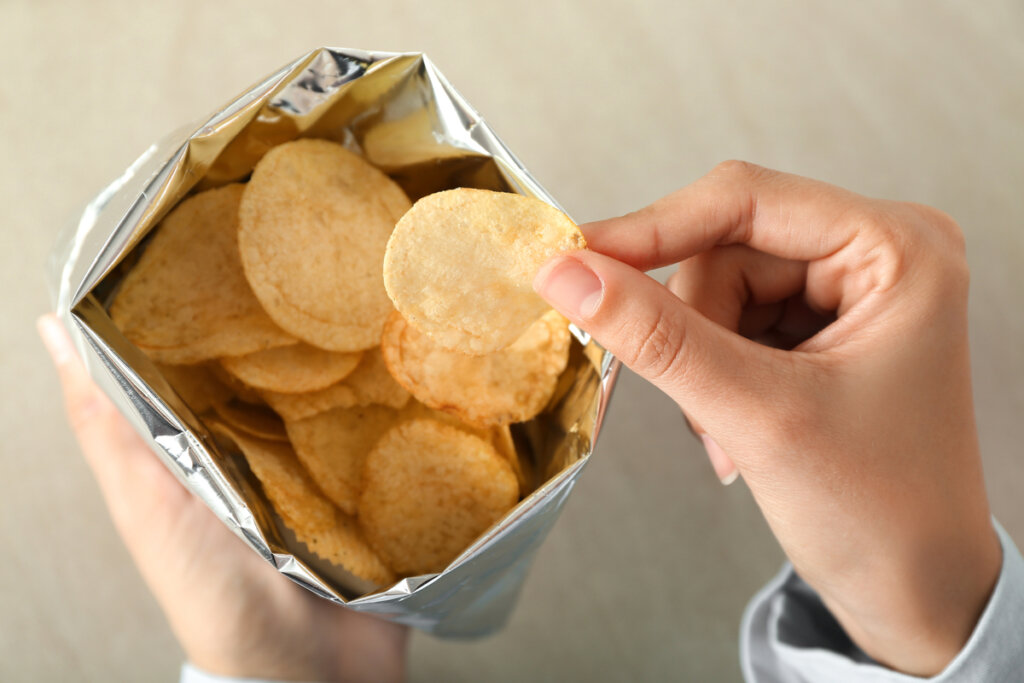Four of the Most Addictive Foods

Some foods are characterized by being extremely addictive. For this reason, you should moderate their presence in your diet. Otherwise, you could be putting your health at risk. Furthermore, it’s important to remember that variety is one of the pillars of good nutrition.
The four foods we talk about in this article aren’t particularly rich in micronutrients and antioxidants. Before we list them, we should mention that there are certain substances that cause the release of neurotransmitters. This causes a sensation of happiness in the short term. Sugar is one of these foods. Hence, if you consume it regularly you can end up becoming addicted to it. Indeed, it’s an element that’s not positive for the body when consumed in excess, so you must always be careful with how much you consume.
In this article, we tell you about four of the most addictive foods you can eat. This doesn’t mean that you should never eat them, but you should certainly moderate their intake.
1. Pizza
Pizza is one of the most popular foods in Italy. However, it’s now well-liked and eaten all over the world. According to a study published in the journal Clinical Chemistry, high-glycemic carbohydrates have the ability to generate addiction, as well as obesity. Pizza is loaded with these elements. They’re mainly present in the dough.
However, you can make good quality pizzas, as long as you choose the toppings wisely. You should also choose doughs that contain whole grain flour. Even so, you should take into account that pizza remains a high calorific food.
2. Chocolate
Chocolate is another of the most addictive foods. This is also due to its sugar content. Its intake causes the release of dopamine, a neurotransmitter that’s linked to short-term happiness. A high synthesis of this element can cause the need for a greater stimulus, which leads you to eat more.
As a general rule, and according to research published in the journal Psychology of Addictive Behaviors, the higher the degree of processing, the more attractive the food. For this reason, the ideal would be to avoid the consumption of highly processed chocolate with a significant amount of simple sugars. In fact, you’d be advised to opt for the bitter version, with a large percentage of cocoa.

3. Cookies
Cookies contain simple sugars and a good proportion of trans fats. Thanks to both of these elements, they possess enviable organoleptic characteristics, much to the delight of many of us. However, eating too many of them can generate addiction. Furthermore, they’re not at all positive for your health.
As a matter of fact, cookies are one of the worst products to include in your daily diet, even though many parents offer them to their children every day for breakfast. In fact, they’re capable of negatively impacting your metabolic health, causing an increase in the incidence of type 2 diabetes.
4. Potato chips
These are also highly concentrated in trans fats. In addition, although good quality oil is used for frying them, the lipids provided by these foods aren’t of good quality. They increase the levels of inflammation in your body, which is detrimental to your health in the medium term.
You should bear in mind that the more trans-fatty acids you include in your diet, the greater the risk is of you becoming ill over time.

Beware of addictive foods
As you’ve seen, some frequently consumed foods can be extremely addictive. All of them are processed except for certain pizzas and types of chocolate. Therefore you should only include them in your diet very occasionally so as not to generate health problems.
Finally, keep in mind that, in addition to taking care of your diet, you must include other good lifestyle habits so your body can function properly. For instance, you should practice physical activity on a regular basis and make sure you sleep for at least seven hours per night.
Some foods are characterized by being extremely addictive. For this reason, you should moderate their presence in your diet. Otherwise, you could be putting your health at risk. Furthermore, it’s important to remember that variety is one of the pillars of good nutrition.
The four foods we talk about in this article aren’t particularly rich in micronutrients and antioxidants. Before we list them, we should mention that there are certain substances that cause the release of neurotransmitters. This causes a sensation of happiness in the short term. Sugar is one of these foods. Hence, if you consume it regularly you can end up becoming addicted to it. Indeed, it’s an element that’s not positive for the body when consumed in excess, so you must always be careful with how much you consume.
In this article, we tell you about four of the most addictive foods you can eat. This doesn’t mean that you should never eat them, but you should certainly moderate their intake.
1. Pizza
Pizza is one of the most popular foods in Italy. However, it’s now well-liked and eaten all over the world. According to a study published in the journal Clinical Chemistry, high-glycemic carbohydrates have the ability to generate addiction, as well as obesity. Pizza is loaded with these elements. They’re mainly present in the dough.
However, you can make good quality pizzas, as long as you choose the toppings wisely. You should also choose doughs that contain whole grain flour. Even so, you should take into account that pizza remains a high calorific food.
2. Chocolate
Chocolate is another of the most addictive foods. This is also due to its sugar content. Its intake causes the release of dopamine, a neurotransmitter that’s linked to short-term happiness. A high synthesis of this element can cause the need for a greater stimulus, which leads you to eat more.
As a general rule, and according to research published in the journal Psychology of Addictive Behaviors, the higher the degree of processing, the more attractive the food. For this reason, the ideal would be to avoid the consumption of highly processed chocolate with a significant amount of simple sugars. In fact, you’d be advised to opt for the bitter version, with a large percentage of cocoa.

3. Cookies
Cookies contain simple sugars and a good proportion of trans fats. Thanks to both of these elements, they possess enviable organoleptic characteristics, much to the delight of many of us. However, eating too many of them can generate addiction. Furthermore, they’re not at all positive for your health.
As a matter of fact, cookies are one of the worst products to include in your daily diet, even though many parents offer them to their children every day for breakfast. In fact, they’re capable of negatively impacting your metabolic health, causing an increase in the incidence of type 2 diabetes.
4. Potato chips
These are also highly concentrated in trans fats. In addition, although good quality oil is used for frying them, the lipids provided by these foods aren’t of good quality. They increase the levels of inflammation in your body, which is detrimental to your health in the medium term.
You should bear in mind that the more trans-fatty acids you include in your diet, the greater the risk is of you becoming ill over time.

Beware of addictive foods
As you’ve seen, some frequently consumed foods can be extremely addictive. All of them are processed except for certain pizzas and types of chocolate. Therefore you should only include them in your diet very occasionally so as not to generate health problems.
Finally, keep in mind that, in addition to taking care of your diet, you must include other good lifestyle habits so your body can function properly. For instance, you should practice physical activity on a regular basis and make sure you sleep for at least seven hours per night.
All cited sources were thoroughly reviewed by our team to ensure their quality, reliability, currency, and validity. The bibliography of this article was considered reliable and of academic or scientific accuracy.
- Lennerz, B., & Lennerz, J. K. (2018). Food Addiction, High-Glycemic-Index Carbohydrates, and Obesity. Clinical chemistry, 64(1), 64–71. https://doi.org/10.1373/clinchem.2017.273532
- Schulte, E. M., Sonneville, K. R., & Gearhardt, A. N. (2019). Subjective experiences of highly processed food consumption in individuals with food addiction. Psychology of addictive behaviors : journal of the Society of Psychologists in Addictive Behaviors, 33(2), 144–153. https://doi.org/10.1037/adb0000441
This text is provided for informational purposes only and does not replace consultation with a professional. If in doubt, consult your specialist.







